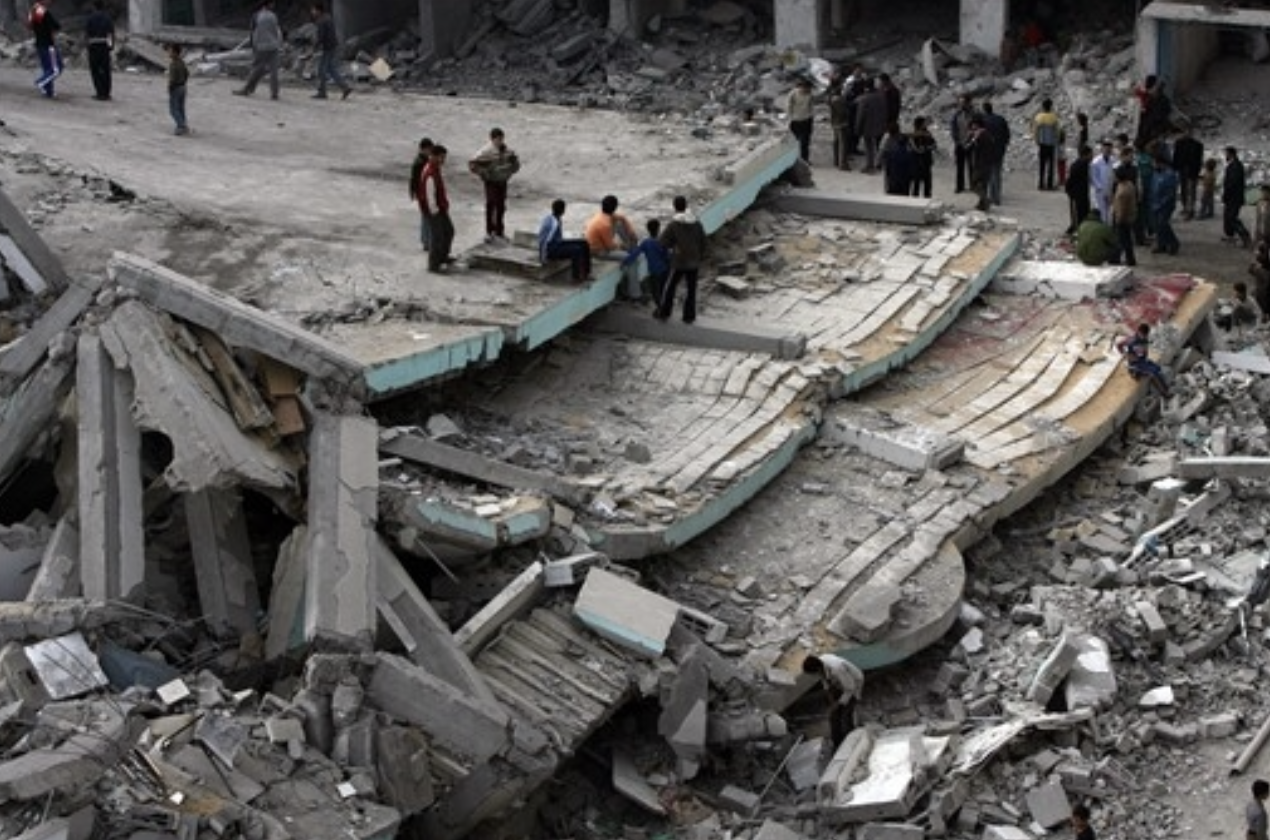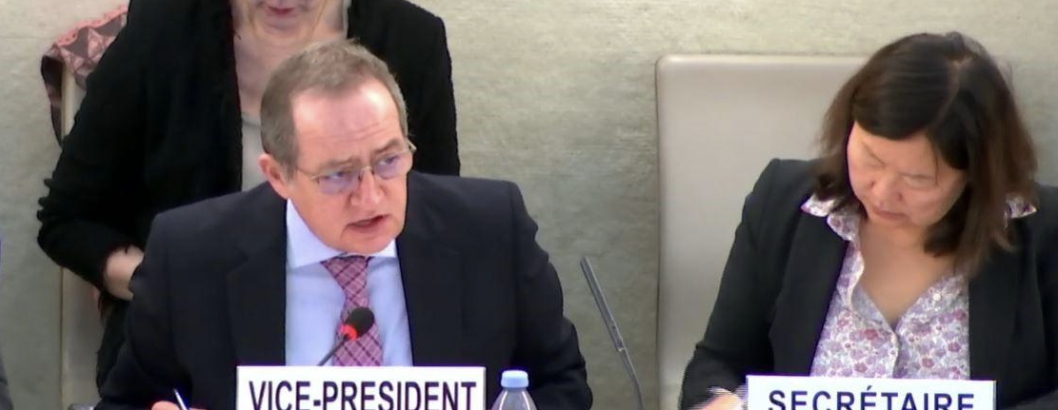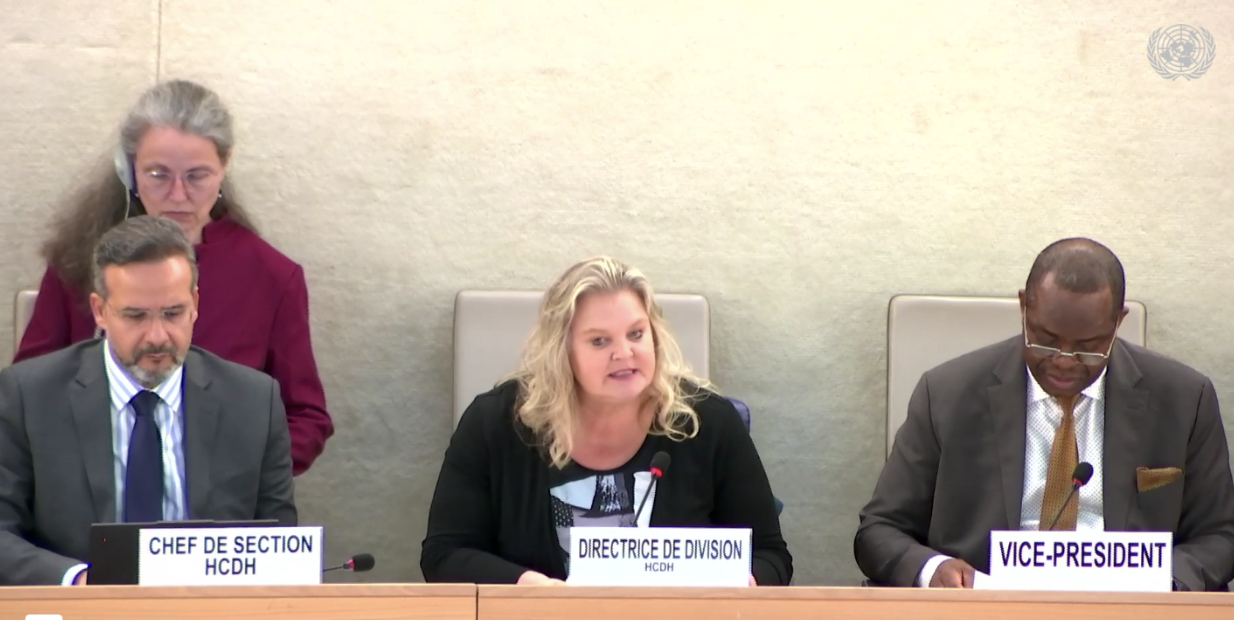50th Session of the Human Rights Council
13th June – 8th July 2022
ITEM 4- ID on Oral Update of Commission of Inquiry on Syrian Arab Republic
29th June 2022
By Sarah Tayara / GICJ
Executive Summary
On 29th June 2022 at the 50th Regular Session, the Human Rights Council held an Interactive Dialogue with the Commission of Inquiry on Syria where it delivered an oral update on the human rights situation in Syria.
After more than a decade of conflict, the people of Syria can only be said to be living in a humanitarian tragedy. With humanitarian needs at their peak, escalating violence and food insecurity, and the Security Council discussing closing off the last remaining humanitarian aid border, Syrians are staring into an abyss of unimaginable levels of pain and suffering.
More than 12 million people have been displaced from their homes since March 2011. At least 400,000 have been killed. 14.6 million Syrians are dependent on humanitarian assistance. At least 150,000 are arbitrarily detained or forcibly disappeared at any one time, and 90% of the country are living below the poverty line.
Mr Pinheiro discussed the growing levels of arbitrary detentions and enforced disappearances. He explored Bashar Al-Assad’s most recent Legislative Amnesty Decree No. 7 which granted a general amnesty for non-fatal crimes of “terrorism” committed by Syrians before 30th April 2022. Further, he called upon Assad’s government to extend the amnesty to civil and political prisoners.
The Syrian delegate rejected the mandate of the Commission and its report, insisting that it was a platform aimed at shaming the Syrian government and smearing it with unfounded allegations. He reiterated that the Commission’s report contained prefabricated accusations which propagated a politicised agenda against Syria aimed at undermining its territorial integrity. The delegates of Iran and Russia concurred with Syria’s statement and criticised the Commission’s encroachment on Syria’s sovereignty. Other delegations firmly condemned the ongoing violations committed against civilians by the Syrian authorities and other actors involved in the conflict.
Geneva International Centre for Justice (GICJ) welcomes the Commission’s findings and condemns the abuse and suffering that the people of Syria have endured for far too long. Sarah Tayara and Amal Bushara delivered joint statements on behalf of the GICJ and Meezan Center for Human Rights and Association Mao’na for Human Rights and Immigration respectively. Sarah called upon an immediate release of all arbitrarily detained civilians, shedding light on the suffering of a Syrian refugee she met when travelling to Syrian refugee camps in Lebanon. Amal emphasised how victims of enforced disappearances are effectively stripped of all their rights, including the rights to a fair trial and due process of law. GICJ joins the Commission calling upon the Syrian government to immediately release all arbitrarily detained civilians and to issue a wider reaching amnesty for political prisoners.
Background
In March 2011, Syrians peacefully took to the streets, calling for greater freedom and dignity following years of human rights abuses. The Syrian government swiftly opened fire on peaceful protestors, meeting their calls for justice with brutal repression. As we enter the 12th year of the conflict, the human rights situation remains bleak. More than 12 million people have been displaced from their homes and at least 400,000 people have been killed, with the real number unknown and likely much higher. 90% of the country is living below the poverty line. Since 2011, the Commission of Inquiry on Syria, established by the Human Rights Council Resolution S-17/, has produced 25 UN mandated reports documenting the grave violations of the most fundamental human rights in the country. In its reports, the Commission relies on witness interviews, photographs, videos, and satellite imagery. Yet, its efforts to carry out a full investigation remains hindered by the Syrian government denying the Commission access into the country.
Interactive Dialogue
Chair of the Commission – Mr Paulo Sergio Pinheiro
 Mr Pinheiro opened the interactive dialogue by giving an oral update on the Commission’s findings. He noted that the people of Syria have suffered through more than 11 years of crisis and conflict. He pointed out that despite describing the Syrian economy in “freefall” in the Commission’s last update to the Council in March, the situation is now worse than ever, particularly following the closing of the last remaining humanitarian border crossing in Syria.
Mr Pinheiro opened the interactive dialogue by giving an oral update on the Commission’s findings. He noted that the people of Syria have suffered through more than 11 years of crisis and conflict. He pointed out that despite describing the Syrian economy in “freefall” in the Commission’s last update to the Council in March, the situation is now worse than ever, particularly following the closing of the last remaining humanitarian border crossing in Syria.
Mr Pinheiro lamented the death of over 400,000 civilians, the displacement of more than half of the pre-war population and the destruction of the country’s cities and infrastructure. With more than 12 million Syrians facing acute food insecurity, Mr Pinheiro highlighted that it is unconscionable that the Security Council is focusing its discussions on closing the last remaining authorised border crossing for aid, instead of strategising on how to extend access to life-saving aid across the country. He noted that all parties to the conflict have consistently failed in their obligations to allow and facilitate unimpeded passage of humanitarian relief for civilians in need across Syria.
Mr Pinheiro also discussed the state of more than 100,000 Syrian civilians who are missing or have been unlawfully detained. He stressed that in government-controlled areas, people live in constant fear of speaking out, with the risk of arbitrary detention, torture or enforced disappearance, constantly looming over them. He referred to President Assad’s recent general amnesty for non-fatal terrorism crimes. He called upon the government to implement the pardon as broadly as possible and to extend it to security and political crimes. He also condemned the inhumane practices of torture and ill-treatment of those forcibly disappeared and arbitrarily detained, as well as the dire situation of the more than 60,000 detainees, including 40,000 children, in the Al-Hol camp. Finally, Mr Pinheiro concluded by reiterating that the dire humanitarian situation in Syria should not be a reason for resignation, but a call for action.
Syria
 Mr Hussam Edin Aala, the representative of Syria, began by renewing Syria’s rejection of the Commission’s mandate and its biased reports. He accused the Commission of prefabricated allegations which overlook the root causes of the crisis. Mr Alaa reiterated Syria’s efforts to restore and consolidate security and stability in the country. However, he noted tat Syria’s efforts are challenged by the Turkish, Israeli and US occupation of parts of its territory. He further reminded the Council of its responsibility to monitor and document crimes of Turkish occupation and hold them accountable. He continued by denouncing the effect of the Universal Coercive Measures and the American plundering of oil, gas and wheat.
Mr Hussam Edin Aala, the representative of Syria, began by renewing Syria’s rejection of the Commission’s mandate and its biased reports. He accused the Commission of prefabricated allegations which overlook the root causes of the crisis. Mr Alaa reiterated Syria’s efforts to restore and consolidate security and stability in the country. However, he noted tat Syria’s efforts are challenged by the Turkish, Israeli and US occupation of parts of its territory. He further reminded the Council of its responsibility to monitor and document crimes of Turkish occupation and hold them accountable. He continued by denouncing the effect of the Universal Coercive Measures and the American plundering of oil, gas and wheat.
Mr Aala pointed to Bashar Al-Assad’s recent general amnesty as evidence contrary to the allegations made against the Syrian government. Lastly, he finished by renewing his call to the Council to end the Commission’s politicised mandate which lacks credibility and objectivity, and instead poses a threat to Syria’s national sovereignty and territorial integrity. He underlined that the Commission’s reports are filled with unfounded accusations and fallacies.
Condemning the Syrian Government
Many States took the floor to express their views on the Commission’s update and put questions before Mr Pinheiro and members of the Commission: Mr Hanny Megally and Ms Lynn Welchman.
The representative of the European Union began by highlighting the EU’s full continued support of the Commission. She condemned the human rights violations of all parties in the conflict, particularly those of the Syrian regime. She continued by deploring the plight of all missing Syrians, and the sexual and gender-based violence committed by the Syrian regime in detention centres. She reiterated the call for extending the jurisdiction of the International Criminal Court as a means of increasing accountability for the human rights violations.
The delegate of Belgium delivered a statement on behalf of 26 Member States of the Geneva Group of Friends on Children and Armed Conflict. He highlighted that the children of Syria have been maimed, abused, detained and recruited in a conflict they had no part in. He noted that school and educational facilities have been targeted by all parties in the conflict, but mainly by the Syrian authorities and their allies. The delegate called upon all parties to immediately cease all violations of children’s rights.
The representatives of Germany, the United Kingdom, France and Greece, amongst others, aligned themselves with the statement made by the EU. They reiterated that Syria is nowhere near to being a safe country, with Syrians being subjected to a staggering level of displacement and humanitarian needs. Innocent civilians, women, and children, all of whom have nothing to do with the conflict, have been forced to endure the brutal effect of it.
The representative of Iceland delivered a statement on behalf of the Nordic Baltic countries. The representative called upon the Syrian regime to engage with UNSCR 2585, and to allow safe and unhindered access to humanitarian organisations. He finished by enquiring what can be done by states to ensure that the crimes, war and suffering against Syrians are not forgotten and that perpetrators are held accountable
The delegate of Qatar condemned the Syrian regime’s deliberate use of enforced disappearances and arbitrary detentions as a weapon of war. She welcomed the Commission’s findings that the regime is deliberately withholding information on enforced disappearances from families and loved ones. She lamented the 2013 Tadamon tragedy, stressing that the situation is no longer a humanitarian issue but rather a moral one.
 The representative of Turkey also discussed the recent footage showing civilian massacres in Tadamon in 2013. He condemned the lack of accountability from the Assad regime, mentioning that 9 million Syrians are dependent on Turkey’s humanitarian assistance thus stressing the need for keeping humanitarian borders open. He concluded by categorically rejecting all allegations made against Turkey.
The representative of Turkey also discussed the recent footage showing civilian massacres in Tadamon in 2013. He condemned the lack of accountability from the Assad regime, mentioning that 9 million Syrians are dependent on Turkey’s humanitarian assistance thus stressing the need for keeping humanitarian borders open. He concluded by categorically rejecting all allegations made against Turkey.
Criticising the Commission’s Politicised Agenda
Some States criticised the Commission, accusing it of pursuing a politicised agenda aimed at manipulating the Human Rights Council. Some States highlighted that UNSCR 46/22 which established the Commission had not actually been supported by Syria as the concerned country, hence rendering its findings unacceptable and biased.
 The representative of Russia condemned the foreign influence in Syria which destabilises and undermines Syria’s territorial integrity. He deplored the Unilateral Coercive Measures imposed on Syria by the West as well as the unfounded accusations on which they are based. The delegate went on to criticise Israel’s recent attack on Damascus airport. He underlined the importance of prioritising the human rights of Syrians but reiterated that the Commission is a means through which Western powers perpetrate their agenda against the “lawful” government of Syria.
The representative of Russia condemned the foreign influence in Syria which destabilises and undermines Syria’s territorial integrity. He deplored the Unilateral Coercive Measures imposed on Syria by the West as well as the unfounded accusations on which they are based. The delegate went on to criticise Israel’s recent attack on Damascus airport. He underlined the importance of prioritising the human rights of Syrians but reiterated that the Commission is a means through which Western powers perpetrate their agenda against the “lawful” government of Syria.
The delegate of Venezuela rejected the Commission and its politicisation against Syria. He accused the Commission of manipulating and distorting the human rights situation in the country. Specifically, the delegate highlighted that its reports do not mention the United States’ ‘sacking’ of Syrian oil and wheat. He pointed to Syria’s recent compliance with the UPR, claiming that itis the only suitable means of assessing the human rights situation in Syria without relying on the politicised use of the Council by western countries to advance their own agenda.
Civil society representatives
The overwhelming stance of NGOs was clear and homogenous. The culpability of the Syrian authorities in the persisting human rights violations of the Syrian people is undeniable. Civil society organisations called for the imposition of international sanctions on armed groups and parties proven to be involved in human rights violations. The civil society organisations called for the establishment of an independent and impartial mechanism to locate the missing. Moreover, they explored the deplorable situation of women’s and child rights, highlighting that their vulnerability often means that they are disproportionately impacted by the harsh realities of war.
GICJ Position
Geneva International Centre for Justice (GICJ) welcomes the Commission’s update and condemns the abuse and suffering the people of Syria have endured for so long. GICJ urges all parties in the conflict to immediately cease all acts of violence against civilians. We join the Commission in calling upon an immediate end to inhumane treatment and torture in detention centres, including sexual and gender-based violence. We also call on the Syrian authorities to issue a wider reaching amnesty for political prisoners.
Sarah Tayara delivered a joint statement on behalf of GICJ and Meezaan Center for Human Rights. She called for an immediate release of all arbitrarily detained civilians, shedding light on the suffering of a Syrian refugee she met when travelling to refugee camps in Lebanon whose brother, father and 4-year-old nephew were detained.
Click here to read the full oral statement
Amal Bushara also delivered a joint statement on behalf of GICJ and Association Ma’onah for Human Rights and Immigration. She emphasised how victims of enforced disappearances are effectively stripped of all their rights, including the rights to a fair trial and due process of law, while their relatives experience ongoing violations of their rights, such as having an unclear legal status, facing discrimination and social stigma, and not having access to a standard of living or education that is adequate.
Additionally, GICJ calls upon the Syrian government to ensure that all feasible measures, in line with UNSCR 24/74 (2019) are taken to locate all those detained and/or disappeared, in order to establish their fate and reunite them with their families.
Click here to read the full oral statement
After a decade of the world looking on to Syrian suffering, it is imperative that governments internationally make a real commitment to strengthen mechanisms of accountability and hold all parties in the conflict accountable for infringing upon the basic human rights of Syrian people. We join the Commission’s outrage at the Security Council’s discussions on closing the final humanitarian aid border. Maintaining the status quo is no longer an option. The time has come to finally put the interests of the Syrian people above the agendas of the parties in the conflict.
International Humanitarian Law, Geneva International Centre for Justice, GICJ, Justice, Syria, Commission of Inquiry Syria, Human Rights, Human Rights Council, HRC50, Syrian Conflict, Syrian War, Syrian Suffering, Geneva4Justice







